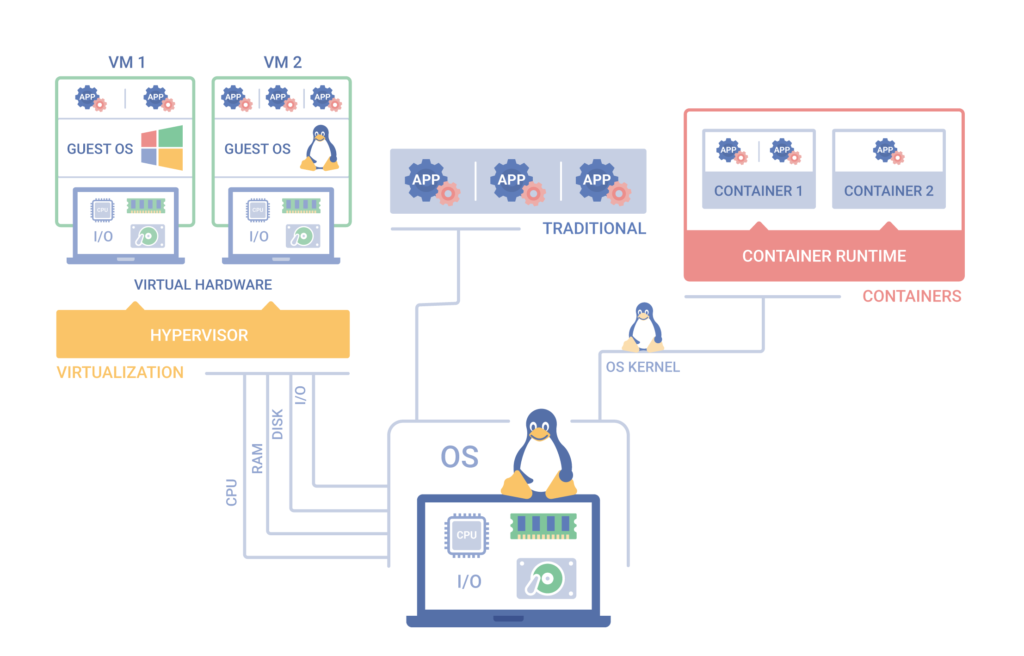At a time when businesses are continuously looking to streamline their path to the cloud, qualities like those found in Docker are becoming increasingly desirable. In fact, according to a recent report by Allied Market Research, the global container market is set to reach $8.2 billion by the year 2025. This has been significantly accelerated by the Covid-19 pandemic and with the benefits of Docker for business laid out below, it isn’t difficult to understand why.

Why Should Companies Use Docker?
Before diving into all the advantages of Docker, however, let’s take a look at its underlying technology.
What Is Docker?
Docker today refers primarily to one of the following: either a hub for public images or a widely used container image standard. Docker Inc.’s fresh approach to containerisation has been broadly supported by the development community, which eventually adopted many of the company’s tools and turned them into industry standards. Consequently, the terms “Docker” and “dockerisation” are often synonymous with “container” and “containerisation” respectively.
Conceptually, therefore, there is nothing particularly new about Docker, but some confusion unavoidably remains. For one, though it is often compared to virtual machines, unlike these, Docker’s resources are shared directly with the host machine. This enables you to run a number of containers where you would normally only run a few VMs. Each container behaves as a micro system with some very specific tasks — making use of its own OS, isolated processes, memory and network resources. As a result, Docker containers may be easily added, removed, stopped and started without affecting one another or the host, which leads to much better speed and performance.
With all of this in mind, the main reason businesses turn to Docker containers is their incredible return on investment. After all, even on older systems, companies are able to run many more applications than before — potentially saving millions in both hardware and electric expenses.

The Benefits of Docker for Business
Yet for company’s seeking to move to containers, return on investment is hardly Docker’s only advantage. In order to prove this, SPG have gathered below some of the top benefits of Docker for business:
1. Promotes standardisation
When it comes to efficient deployment, consistency becomes absolutely essential. Thankfully, Docker brought several new things to the table that earlier container systems simply never did. Above all, it made containers much easier to deploy whilst never losing sight of security measures. In addition, thanks to its strategic partnerships with Red Hat, Canonical, Google and others, Docker’s position was irretrievably strengthened, which led to widespread standardisation. Today, Docker standardises the infrastructure across the entire delivery pipeline and offers consistent development at scale. This enables every IT team to streamline their work in the production environment, and helps grateful software developers to find bugs and fix them efficiently.
2. Supports microservices
While Docker may also be used to containerise monolithic applications, more and more, businesses are turning to the microservice architecture, as they enable faster deployments and updates. In fact, Docker greatly simplifies this process by automating the way you build, share and manage microservice apps throughout the organisation. Moreover, because microservices are provided along with their isolated workload environments, they can easily be scaled and deployed independently.
3. Increases mobility
Docker images are free of any physical limitations at all, which makes deployments both portable and scalable. The widespread popularity of its image format further helps to reaffirm these characteristics, as it’s already been heavily adopted by a number of leading cloud providers — e.g. Google Cloud Platform, Amazon Web Services (AWS) and Microsoft Azure. This paired with a powerful orchestration system such as Kubernetes can prove extremely useful in terms of mobility.
4. Provides greater flexibility
Docker is also extremely flexible, as it enables businesses to build, test and release images that may then be deployed across multiple servers. Even when implementing new security patches, the process still remains the same — simply apply the patch, test it and release it to the production environment. In addition, Docker enables you to start and stop services at a moment’s notice, which is particularly useful within the cloud environment.
5. Enhances security
Finally, the service provides enhanced security for all of your company’s applications and containers. This is vital in the age of digital data, because hacks and other cyber crimes are continuously on the rise. Yet by isolating containers completely, Docker gives developers total control over application management.
Docker Scalability for Growing Businesses
The flexibility and cost-effectiveness of Docker are made even better when eyeing the future of your business. After all, if you are scaling your company’s product or services, why tie yourself to outdated processes when you can embrace full modularity and automation? Listed below are some official solutions that can help your company to achieve these objectives.
Docker Tools
1. Docker Hub
A hosted repository service provided by Docker, Docker Hub offers a cloud-based platform with over 100,000 freely available container images. This enables developers around the world to share and test their applications with ease. Some key features include private repositories, official images, publisher images, webhooks and automated builds.
2. Docker Compose
The more microservices you have in your environment, the more each service should possess its own container. As a developer, however, you should be able to easily jump from one container to another. This is where Docker Compose can greatly benefit your organisation, as it utilises a simple YAML file to connect containers as if they were a single service. In this way, each container continues to run in isolation but can interact with one another when needed.
3. Docker Swarm Kubernetes
Thanks to container orchestration, companies are able to expand and manage their container clusters across various machines or the cloud. Even better, however, they can increase their application availability, so you can ensure that your service continues to function in the event of node manager failure.
With this in mind, in order to deal with the ever growing amount of containers, Docker Swarm was introduced by Docker. Though on the surface, the orchestration tool may seem similar to Docker Compose, Docker Swarm creates multiple containers on multiple hosts, and instead of making use of a YAML file, helps you manage various Docker hosts within a cluster. More recently, however, Swarm has been dethroned by Kubernetes, an orchestration tool created by Google that is more powerful, flexible and customisable, and is supported by every major cloud provider. Though it may come with a steeper learning curve, Kubernetes benefits from a powerful ecosystem.
4. Docker Volume
While in the past, developers were limited to working with the file system provided by images, volumes are files or folders which not only exist outside a container, but can be used by a container through mount points. Each container may mount zero or many volumes, which can be shared between containers and the host itself. Put simply, therefore, Docker volumes enable working with data and present a number of formidable advantages:
- Easier to back up and migrate
- Can be managed from the Docker API or CLI
- Are safer to share among containers
- Can be encrypted and stored on remote hosts or cloud providers
- Do not increase the size of the container
- Are both Linux and Windows compatible
Live Cases
At Software Planet Group, we have extensive experience working with Docker, as we have used it with tremendous results in projects spanning all industry verticals:
Cloud monitoring application
SPG were asked to modernise the technical infrastructure of a cloud monitoring application enabling users to measure the health and performance of their web apps through real-time interactive graphs. After conducting initial research, our specialists replaced the legacy storage system with TimescaleDB in the cloud, applied the Infrastructure as a Code approach to make maintenance easier and smoother and markedly reduced upkeep costs by moving services to the cloud with Docker. We also updated CircleCI configurations, designed a brand new architecture and migrated the legacy code into a multi-cluster Kubernetes architecture.
Healthy lifestyle promotion app
A startup company approached our dev team to work on a healthcare mobile application that promoted healthy living through both exercise and mindfulness practices. In addition to fixing defects in the iOS and Android code base, our DevOps team also performed an audit for the existing infrastructure in place before implementing security enhancements, dockerising the current environment, implementing SSL/TLS encryption, setting up monitoring through AWS CloudWatch and creating a GitLab account to maintain the code base in a single repository.
Bare metal instance management
SPG partnered up with a Finnish bare metal rental business to develop a market-ready software system. The service aimed to provide high-quality hardware instances for GPU and AI/ML rendering. Software Planet Group were called on board to design, develop and deliver the application from scratch. Our specialists worked closely with the company founder to efficiently meet their target deadline, and convert the company vision into a fully-functioning software solution. In addition, we set up a Node.js-based microservice architecture to ensure smooth scalability, and by unitising Docker, configured CI/CD on the self-hosted GitLab infrastructure.
Our Take on Docker for Business
As companies continue to reinvent themselves after the Covid-19 pandemic, there has never been a better time to invest in Docker for business. In our own experience at SPG, Docker places collaboration at the heart of containerisation and makes working with complex clusters a breeze. We recommend it wholeheartedly for both startup businesses and larger organisations and would be happy to help you implement it into all of your future endeavours.



